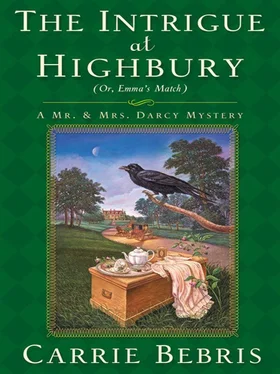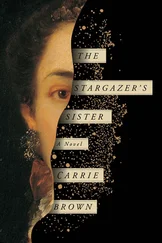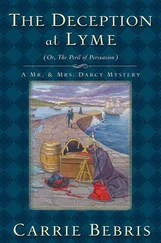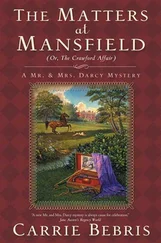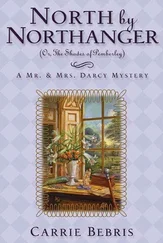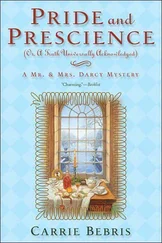“Whatever Mr. Deal’s actions — or lack thereof — by Miss Jones, the author has drawn our attention to him in some connection to Richmond,” Mr. Knightley said. “We know that Mr. Deal does business there, for Richmond is where he obtains his sling bullets. We need to determine whether he was there at the same time as the Churchills, and what, if any, contact he had with them.”
“Mrs. Weston’s housekeeper has a sister in Richmond,” Mrs. Knightley said. “She wrote of doing business with Hiram Deal this past summer.”
“Did not Mrs. Churchill die during the summer?” Darcy asked.
“Yes,” Mr. Knightley said. “On the twenty-sixth of June.”
“Perhaps Mr. Deal is the unkind individual who witnessed the murder of Churchill— Agnes Churchill.” Darcy paused. “Or perhaps he committed it.”
“I thought her physician determined that she died of an apoplectic seizure,” Mrs. Knightley said.
“It is in his professional interest for that to be the case. It might not be in the interest of justice for us to accept the diagnosis without question,” Mr. Knightley replied.
“Let us begin by ascertaining whether Mr. Deal’s time in Richmond coincides with that of the Churchills,” Darcy said. “We should speak to the Churchills’ servants and learn whether he ever called at their house. If we are fortunate, the attendants who accompanied Frank and Edgar Churchill to Randalls will be able to help us.”
Mr. Knightley nodded. “If not, we shall have to track down the staff who served them while they leased the house.”
“Should a journey to Richmond prove necessary, I can depart as soon as a horse is readied,” Darcy offered.
“I hope it is not needed,” Mr. Knightley said. “The afternoon is already half gone, and I want to confront Mr. Deal himself by day’s end.”
Thanks to the recollective powers of a footman who had served the Churchill family for twoscore years, Darcy was spared a hasty ride to Richmond. He instead spent the evening with Mr. Knightley and Hiram Deal. It had been Mr. Knightley’s idea to host the intimate little gathering in his small study at Hartfield, which afforded more privacy than the Crown, his usual venue for magisterial business.
It had not been Mr. Deal’s idea to attend it.
The peddler arrived in the escort of Mr. Cole. Though Mr. Deal labored to maintain his customary affability, there was wariness in his manner as he greeted Mr. Knightley and Darcy.
At Mr. Knightley’s nod, Mr. Cole left the study. The constable would wait in the drawing room with the ladies and Mr. Woodhouse, near at hand should he be wanted. As far as Mr. Woodhouse knew, Mr. Cole — and his waiting carriage — were at Hartfield to visit Mr. Woodhouse. Mrs. Knightley’s father need not know that a suspected murderer was presently under his roof.
With brusque civility, Mr. Knightley invited Mr. Deal to take a seat opposite himself, the large writing table between them. Mr. Deal sat on the edge of the chair, leaning slightly forward like a man ready to engage in conversation — or poised to flee. Darcy remained standing off to one side.
The magistrate did not waste time on pleasantries. “Mr. Deal, have you any notion why I asked you to come here this evening?”
“None, sir. Though I suspect you do not wish to see my inventory of brandy.”
The attempt at levity failed to elicit a smile from Mr. Knightley. “Tell us about your business with the Churchills.”
“The Churchills?” The peddler, clearly perplexed, glanced from Mr. Knightley to Darcy and back. “I thought I had — when we spoke some days ago, Mr. Darcy — but certainly, I can repeat it for you. I sold the younger Mr. Churchill a snuff box.”
“We mean your previous business with the family,” Darcy said. “In Richmond.”
The peddler blinked. “Richmond? I never met either of the misters Churchill in Richmond.”
“But you did visit their house. On June twenty-sixth.”
“I visited many homes in Richmond last June. Usually I deal with the servants or the lady of the house. Rarely gentlemen. As to whether I stopped at the home of a family named Churchill specifically on the twenty-sixth, I cannot say. Surely you do not expect me to remember with such clarity the calls I made five months ago?”
Darcy stepped closer, forcing the peddler to tilt his head up to look at him. “You recall the history of every item you hawk from your cart. I indeed presume you capable of recollecting a meeting on the twenty-sixth of June that resulted in a heated argument with the lady of the house. The servant I spoke to today certainly remembers it.”
Mr. Deal shifted, turning his body so that he no longer faced Darcy, but Mr. Knightley. He did not, however, look at the magistrate. He stared at the clawed feet of the writing table as he brought up his maimed arm and absently rubbed the stump with his hand. His countenance bore an expression of defeat. And shades of fear.
Mr. Knightley rested his own arms on the table and formed a temple with his fingertips. “Mr. Deal, the servant’s testimony provides sufficient cause to arrest you tonight. If you wish to offer your own explanation of events, or have anything to say on your behalf, now would be the time to do so.”
Mr. Deal opened his mouth to speak, but no words issued forth.
“You had a row with Mrs. Churchill, after which she suddenly died. I doubt you fought over the price of lace,” Darcy said. “The servant told me that he had seen you loitering near the house for a se’nnight previous.”
Mr. Deal’s jaw tightened.
“What business brought you to the house?” Mr. Knightley asked. “How did you know Agnes Churchill?”
Mr. Deal raised his head. The look he gave Mr. Knightley was direct and unapologetic.
“She was my mother.”
Volume the Third
in which Highbury becomes acquainted
with a murderer
Seldom, very seldom, does complete truth belong to any human disclosure.
— Emma
“Oh, Mrs. Churchill… What a blessing, that she never had any children! Poor little creatures, how unhappy she would have made them!”
— Isabella Knightley ,
Emma
“We are to believe that in her youth, Agnes Churchill secretly bore a child that she kept hidden for decades?” Though Mr. Knightley voiced the question, Darcy was equally incredulous.
“My birth was not a secret, only my life — even to her.”
“Mr. Deal, kindly explain yourself.”
As Mr. Knightley spoke, movement at the door caught Darcy’s attention. Elizabeth silently entered. Her expression indicated that she had something to tell him, but a brief exchange of unspoken communication indicated that it was not exigent. As he did not want to interrupt Mr. Deal or miss what he was about to say, Darcy motioned her to wait quietly. Mr. Deal’s back was to her; he had not seen her enter. Elizabeth’s attendance would not inhibit his admissions. Mr. Knightley gave no sign of disapproval and did not betray her presence.
“I have had, in truth, three mothers,” Mr. Deal said. “Only two, however, deserve the name. Though Agnes Churchill gave me life, she would have stolen it from me just as quickly had the nurse who attended my birth followed her orders. Thankfully, the nurse instead took me far away and gave me to her childless cousin.”
Since entering Highbury, Darcy had not heard one favorable word about Agnes Churchill. Still, he found it difficult to comprehend any mother’s being capable of what Mr. Deal alleged. Or any father. “Were you born out of wedlock?”
Читать дальше
